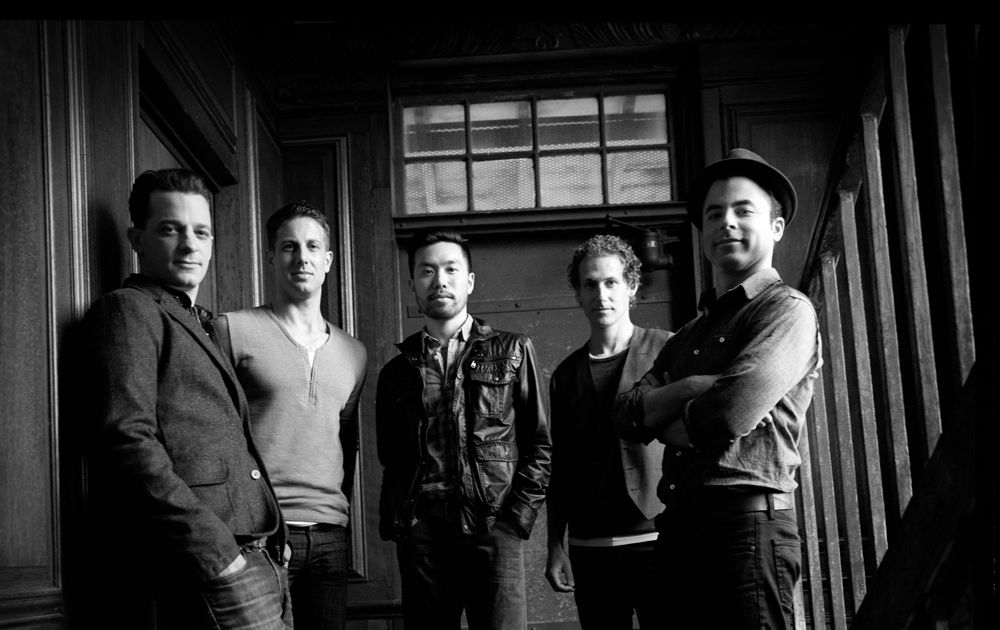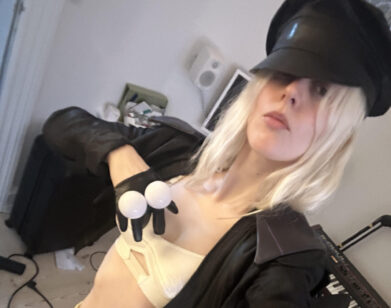O.A.R., Fifteen Years On…

ABOVE: O.A.R.
It is no secret that music trends, like fashion trends, are ephemeral. Remember when five-piece boy bands were almost a guaranteed moneymaker? Or when Sum 41 and pop-rock dominated the charts (and dated Paris Hilton)? Or, if you want to go further back: punk-rock, disco, nine-minute instrumental songs? To circumvent the in vogue/out of vogue loop, should artists constantly change their musical style and appearance à la Madonna or (sort of) Britney Spears? (While Madonna and Britney are admittedly still somewhere in the “pop” genre, you would never expect to find the dubstep breaks of “I Wanna Go” in “Sometimes” or “Born to Make You Happy” or “I’m Not a Girl…”) Or do they preserve their original style and yet how somehow, magically, still seem time appropriate like the Red Hot Chili Peppers, the Beastie Boys or Jay-Z?
One band that could have easily been forgotten with the times is a ska-influenced roots-rock band O.A.R. When O.A.R. had their first big hit, “That Was a Crazy Game of Poker” in the early 2000s, similar bands such as 311, Dispatch and, to a certain extent, Dave Matthews Band dominated the Billboard Top 10. While Dispatch disbanded in 2007 (they have only just reunited) and Dave Matthews Band hasn’t released an album in the past few years, O.A.R. has been selling out concerts in Madison Square Garden and producing platinum albums.
In a music climate that seems dominated by hip-hop, dance/dubstep cross-over, and indie-folk, O.A.R. are arguably more popular than ever. It seems that the fans who made O.A.R. famous—for O.A.R. became a college/teenage boy favorite long before they signed to a record label—have stuck by the band. Interview spoke with O.A.R.’s drummer, Chris Culos, about the ever-changing music scene, Napster, and how fans have kept O.A.R. in business for the past 15 years.
EMMA BROWN: Hey, Chris. What are you up to?
CHRIS CULOS: I’m in DC. I’ve got Benj [Gershman], our bass player with me and we’re driving down to the venue for our fourth show this week.
BROWN: Are you doing five shows in every city?
CULOS: We’re doing four or five; we’re doing five in New York [City] next week and four in Philly the week after that.
BROWN: That sounds tiring.
CULOS: We travel and we tour so much, [and] sometimes a tour can be anywhere between three and six weeks, so instead of being in a different city each day, it’s kind of nice and not as tiring to be in the same city. You don’t have that extra travel, you get to explore the city. Here, in DC, it’s where four of the five band members are originally from, so we get to see our family. Some of us are even crashing at our parents’ houses. We’re making somewhat of a family vacation out of a work week.
BROWN: When you guys started as a band, you were very much in line with the popular music scene; other bands, like Dispatch, had similar musical styles to you and were also very successful commercially.
CULOS: Yeah, we came up right around the same time that Dispatch did. We were fortunate enough to play a few shows with them before they went on hiatus and we’ve been able to keep in touch with them, they’re good friends. There are a handful of bands out there who have kind of been hitting the road and hitting it hard for the last decade that we appreciated working with. It is a tough business, but we respect and look up to all the bands around us that are really working hard.
BROWN: Popular music has changed so much since you first started, it seems to be much more focused on hip-hop and dance music now, how has that affected you guys? I feel like when you started around the late ’90s/early ’00s, your style of music was sort of the music of the time…
CULOS: Every part of the music industry has changed, and it’s so crazy. At first it was kind of a slow change and we could prepare for stuff to happen, but now you just can watch it change weekly. It’s cool because for us, I don’t think we’ve ever really had that moment where we played a show and the next day we were a huge hit, we never had that overnight success. So for us to kind of come up steadily and slowly, I think it’s enabled us to have a longer career. Like you said, everything changes so much, and a lot of the bands we played with, unfortunately they haven’t stuck around. For to be able to stay in touch with our fan base and keep making music that we feel stays true to ourselves but also pushes ourselves a little bit, those are all definitely part of the reasons why I think we were able to be able to do that [survive as a band].
BROWN: How do you maintain such a strong fan base?
CULOS: We enjoy hearing the feedback. We have an online message board that started out as a community of people who would come and tape our shows and then trade them. We really embraced that from early on, people saying “Hey, you’ve got to check out this band,” because we had less radio exposure at the time and radio kind of comes and goes, but having that grassroots, really loyal fan base, is something we always want to maintain.
BROWN: How have the crowds at your concerts changed over the years, or have they changed…?
CULOS: They actually have changed. It started off as a college demographic; when we were playing at Ohio State, we started touring regionally and playing different colleges and spreading out to the Midwest. Napster was also a big help early on—every college kid was on Napster back in the day. I think that’s why we had such a college fan base [when we started]. But then [college kids] go home on breaks and they play the music for their younger brothers and sisters and that spreads, then we signed to a major label [Lava Records, in 2003] and we started being able to get some songs on the radio and get some mainstream attention, so we got a little bit of an older audience. Now, certain shows in certain cities can be very different, we played a show in Minneapolis and it seemed like it was all middle-aged VH1 crowd. We played Milwaukee the next night and it seemed like all teenagers.
BROWN: What song are audiences most enthusiastic about?
CULOS: “That Was A Crazy Game of Poker.” The crowd every night goes bonkers for it. People always ask if we get sick of playing the same song every night, and you’d think with that one we would, but [when] the crowd just goes crazy you can’t help but be excited.
BROWN: Do you ever feel like, “We’ve been doing this for a while now, and it’s been great, but we should quit while we’re ahead and I really want to try my hand at something new, like… pottery”?
CULOS: That’s a good question, but honestly the more we do this, and this is going to sound cheesy, we realize that this is what we love doing and we feel like we’re doing the “right” thing. When we graduated college and started to do this full-time there was a little voice in the back of my head that was like, ” I don’t know if you should be messing around in a rock-‘n-roll band. You were raised to go to college, get a job and raise a family. This is too good to be true.” But [now] we just feel so comfortable together as a band; it kind of feels like it’s just the beginning. After 15 years in a band I wake up and say [to myself], “Dude. This is just the beginning.”
O.A.R. WILL BE PLAYING FIVE CONSECUTIVE SHOWS AT THE BOWERY BALLROOM FROM TONIGHT THROUGH MARCH 10. THE BAND’S SEVENTH ALBUM, KING, IS OUT NOW.






